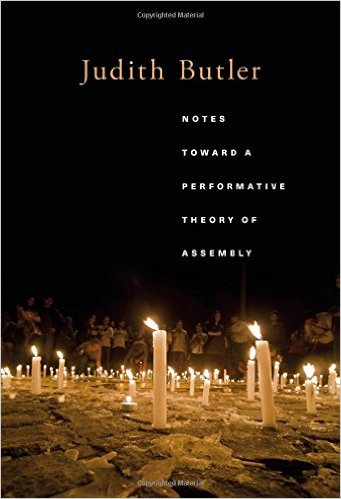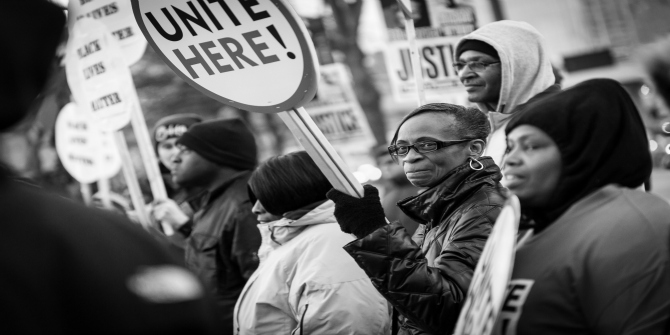In Notes Toward a Performative Theory of Assembly, Judith Butler draws upon her influential theorisations of performativity and precarity to examine the politics of public assembly, discussing such themes as the crucial bodily component to acting in concert as well as the role of media. This accessible account is highly relevant to contemporary movements such as Black Lives Matter, and will be of use to those working across the humanities and the social sciences as well as activists, writes Alexis Bushnell.
Notes Toward A Performative Theory of Assembly. Judith Butler. Harvard University Press. 2015.
 Judith Butler is a name that has been prevalent in academia for years, bringing us theories of performativity and precarity, amongst others. Her most recent book, Notes Toward a Performative Theory of Assembly, is a 219-page intellectual enquiry of public assembly politics. Butler employs her past work on precarity as an angle into understanding aspects of public assembly. She describes precarity as characterising ‘that politically induced condition of maximised vulnerability and exposure for populations exposed to arbitrary state violence, to street or domestic violence, or other forms not enacted by states but for which the judicial instruments of states fail to provide sufficient protection or redress’.
Judith Butler is a name that has been prevalent in academia for years, bringing us theories of performativity and precarity, amongst others. Her most recent book, Notes Toward a Performative Theory of Assembly, is a 219-page intellectual enquiry of public assembly politics. Butler employs her past work on precarity as an angle into understanding aspects of public assembly. She describes precarity as characterising ‘that politically induced condition of maximised vulnerability and exposure for populations exposed to arbitrary state violence, to street or domestic violence, or other forms not enacted by states but for which the judicial instruments of states fail to provide sufficient protection or redress’.
While the current book weaves ideas of precarity throughout, these concepts are used to complete a tapestry focused on performative assembly. The book questions the role and aspects of public assembly, performative space and the performing body, explaining that ‘performativity characterizes first and foremost that characteristic of linguistic utterances that in the moment of making the utterance makes something happen or brings some phenomenon into being’. From there, Butler questions how bodily acts become performative and explores the ways that lives and bodies are connected to one another and to larger systems. Indeed, she states that the book’s thesis is ‘that acting in concert can be an embodied form of calling into question the inchoate and powerful dimensions of reigning notions of the political’.
The first chapter, ‘Gender Politics and the Right to Appear’, points to the situation of precarity that individuals find themselves in, due at least in part to the socio-economic and political system. It explores how the gathering of individuals experiencing precarity demonstrates to the system, and to others, that their situations are shared, laying the building blocks for a common understanding of their experiences. She suggests that ‘gender politics must make alliances with other populations broadly characterised as precarious’. Questions surrounding which humans count as human and are eligible to appear, what justice is, what we call those who do not and cannot appear as ‘subjects’ within hegemonic discourse, how the excluded appear and the living and social conditions of agency are just some of the ideas that are explored. The thoughts in this chapter may be read in dialogue with many contemporary issues and movements, such as Black Lives Matter or those relating to refugee and immigrant migrations, sexual minorities and others.
 Image Credit: Dorret
Image Credit: Dorret
In the second chapter, ‘Bodies in Alliance and the Politics of the Street’, Butler discusses the performativity of mass demonstrations, which is again particularly relevant not only to recent political movements across the Middle East and protests in Turkey, but also now in the United States in relation to the aforementioned Black Lives Matter. Especially timely is Butler’s statement that ‘media is not just reporting who the people claim to be, but media has entered into the very definition of the people’. Although the role of media in documenting terrorism and killings by police of black Americans takes various forms, such as police vehicle dash cameras as well as cellular phone videos recorded by bystanders, Butler is speaking specifically here of filming police as a way of countering state-sponsored narratives of violence. Through film, ‘the people’ in a society are vocal and visual, performing within conditions leading to situations dictated by contemporary society. Continuing this thread later in the book, she draws out and comments on the political and human meaning of the statement ‘we the people’ in a very interesting and important discussion.
A fair amount of analysis in the book is dedicated to dissecting Hannah Arendt’s writings on political space. Importantly, Butler points out that what is missing from Arendt’s account of the political is ‘the operation of power – the foreclosure and differential allocation of whether and how the body may appear’ (88). Butler writes that she accepts the following from Arendt:
Freedom does not come from me or from you; it can and does happen as a relation between us, or indeed, among us. So this is not a matter of finding the human dignity within each person, but rather of understanding the human as a relational and social being, one whose action depends upon equality and articulates the principle of equality […] The claim of equality is not only spoken or written, but is made precisely when bodies appear together, or rather, when through their action, they bring the space of appearance into being (89).
Discussing the corporeal body and the way it is used to perform the right to have rights, Butler argues, referencing Arendt, that ‘the right to have rights is one that depends on no existing particular political organization for its legitimacy’, and discusses the way that power may interact with the body when it resists. While Butler examines Arendt’s work throughout the book, she also discusses Emmanuel Levinas’s work regarding ethics, proximity and cohabitation through a lens of Jewishness and the Occupied Territories in the chapter ‘Precarious Life and the Ethics of Cohabitation’. The book concludes with a chapter discussing a question popularised by Theodor Adorno: whether one can ‘lead a good life in a bad life’.
While Notes Toward A Performative Theory of Assembly posits and comments upon a range of substantial material in a relatively compact space, the writing and ideas are far from impenetrable; rather, Butler writes in an uncomplicated manner about significant ideas. The book should be read by anyone interested in political science, human rights, social activism, critical theory, gender studies, socio-legal studies and philosophy, as well as those who themselves are part of contemporary movements.
Alexis Bushnell has a PhD in International Human Rights law from the Irish Centre for Human Rights. She also has an LLM in Humanitarian Law and Conflict. Alexis’ past work focused on private security contractors, consulting for the United Nations Assistance Mission in Somalia. Her current research is socio-legal, with a focus on refugee law and human rights law, and examines the role of refugee camps as a mechanism for refugee management, shedding light on the questionable political and juridical foundations of refugee camps. She has also taught at the Hueston Film School, focusing on human rights in art. Read more reviews by Alexis Bushnell.
Note: This review gives the views of the author, and not the position of the LSE Review of Books blog, or of the London School of Economics.







Oh Judith. Her problem’s simple, you know: she isn’t very good at writing.
There’s something so human about her unwillingness to actually face up to it, and how people wince and tiptoe around mentioning it because she writes about big, interesting topics, but she has no filter and no self-awareness. But calling her work “accessible” by this point is like handing a drunk-driver the car keys.
I wish she would just stop writing books and have someone else write the books for her. Surely someone would be willing to be her ghostwriter? Or could everyone get together to stage an intervention?